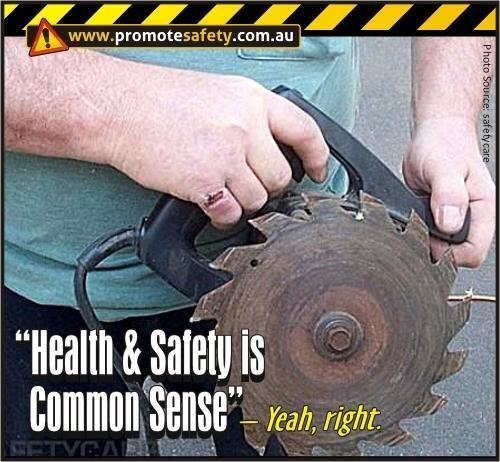
If you want a safety professional’s head to explode, tell them safety is just common sense.
Recently, this image appeared on a post on LinkedIn. Essentially, the question asked is, “is this Common Sense?” So what is so common sense about it?
What if the employer supplied the equipment and never provided suitable information, instruction, training or supervision, is it still just common sense?
The definition of common sense from the Merriam-Webster dictionary is “sound and prudent judgment based on a simple perception of the situation or facts.” Common sense would suggest not to touch / go near a poisonous snake or to turn off the burner after removing the kettle – but how many people have been bitten or burned?
If you ask a Psychologist about common sense, they may argue that common sense is not so straight forward, usually by comparing two seemingly common sayings such as:
Example a): ‘birds of a feather flock together’ versus ‘opposites attract’
Example b): ‘out of sight, out of mind’ versus ‘absence makes the heart grow fonder’
Clearly these are mutually incompatible. But are they common sense?
Now throw yourself into a complex working environment. A construction site. Imagine having struggles at home that are mounting? Your boss is pressuring you to get the work done. You sat through a 2 hour induction in the morning and are feeling overwhelmed by the amount of information, followed by sensory overload when you finally reach the site. Add to the mix the pressure from the work supervisor and safety culture of the site which seems to condone using faulty equipment. Does anyone ever place out-of-service tags on damaged equipment? Are out-of-service tags even available? Does everyone understand who is allowed to remove out-of-service tags or is that just common sense?
What about experience? Interpretation?
The point is, the human mind and human behaviour is complex. There are a plethora of factors that influence behaviour thus the whole situation needs to be understood. Suggesting otherwise would imply that a person who has sustained an injury is stupid (lacking common sense implies stupidity). Such an approach would simply foster a toxic and blame culture.
I am not condoning the use of machinery without appropriate guarding. I am suggesting that safety is much more complex than just common sense. There is a reason for the plethora of Acts, Regulations, Codes of Practice, Australian/NZ standards – I’m guessing common sense is not one of them.
Note: here is the full LinkedIn post: https://www.linkedin.com/hp/update/6183244958900715520

